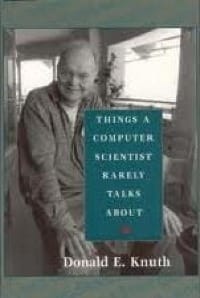Past Book Review (May 22, 2005): "Things a Computer Scientist Rarely Talks About"
Past book review (i.e. posted prior to starting this blog) for Things a Computer Scientist Rarely Talks About, by Donald E. Knuth, Center for the Study of Language and Information - Lecture Notes, 2003:


In modern, Western, pluralistic, secular culture, it is currently still difficult for many to understand the interconnectedness of "science" and what is often called "religion", and to discuss many of the topics included in the text of this Knuth work. However, while this book could have been titled "Things that Society Rarely Talks About", the text specifically centers around the computer scientist and the software engineer. While the majority of "Things a Computer Scientist Rarely Talks About" is in essence a transcript of Knuth's lectures at MIT, a transcript of a panel discussion also included in the concluding pages of the book, as well as the Q & A sessions following each of the 6 lectures, provide societal context in that the thoughts of other thinkers in this field are given argueably equal treatment alongside that of Knuth.
I would argue that the content of the fourth lecture is a bit too much centered around the author's work on "3:16", but I found this material fascinating, especially in light of Knuth's third lecture on the difficulties of natural language translation and how this difficulty is not as prominent in computer science. As a software engineer, I consider this book to be an extensive (although sometimes incoherent) expansion to the occasional spiritual comments made by Frederick Brooks in his classic software engineering work, "The Mythical Man Month" – more specifially, the pages Brooks wrote on the "joy of the craft" in which he compares the joy of the software development process to "God's delight in making things", and his comments on "the delight of working in such a tractable medium" where one is "only slightly removed from pure thought-stuff".
Guy Steele, of Sun Microsystems, notes in the panel discussion that "…the study of computer science, as we know it, is a human activity, so far; human activity is spiritual, at least in part; and therefore the study of computer science is spiritual, at least in part. This may seem to beg the question. My point is that by human activity I mean to imply activity with purpose. I want to talk here about purpose. Why do computer science? Because it's fun? Because it is beautiful? To earn enough money to buy mango ice cream at Toscanini's [an ice cream parlor near MIT]? To improve the lot of humankind? To serve God? For me, it is ALL of the above."
Knuth's lectures, the Q & A, and the panel discussion are all presented in what appears to be a sincere discussion of related topics that many would rather not discuss. Both Knuth and the members of the panel admit that they do not have all the answers, and that there is some confusion. For example, a self-proclaimed "devout agnostic", Mitch Kapor, who designed Lotus 1-2-3, here discusses that during the 1970s he became a teacher of transcendental meditation – of which he describes it as a "…very interesting experience. I can tell you that people really don't levitate. In fact, it is a cult, at least if you get highly involved with it. I have a lot of bruises acquired along the way from some of my involvement. I am kind of a Buddhist fellow traveler, in the sense that I have a lot of affinity for a Buddhist's way of thinking; but I just can't seem to make it in any organized religion, including Buddhism". So while Knuth is grounded in the Christian worldview, and is not a relativist, he as well as everyone else participating in this discussion has questions that have no certain answers – this fact must of course be one of the underlying premises of this book.